高中英语人教版选修六Unit 5 The Power Of Nature(4)课件(60张ppt)
文档属性
| 名称 | 高中英语人教版选修六Unit 5 The Power Of Nature(4)课件(60张ppt) |
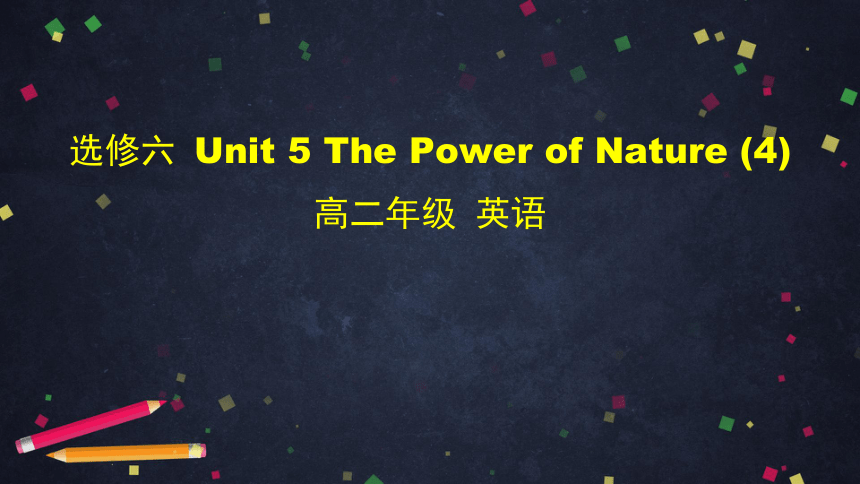
|
|
| 格式 | zip | ||
| 文件大小 | 3.8MB | ||
| 资源类型 | 教案 | ||
| 版本资源 | 人教版(新课程标准) | ||
| 科目 | 英语 | ||
| 更新时间 | 2020-06-02 00:00:00 | ||
图片预览

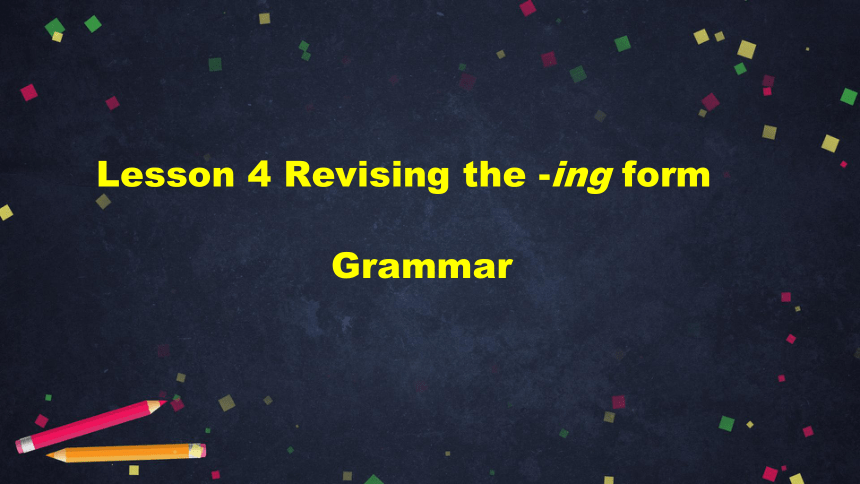
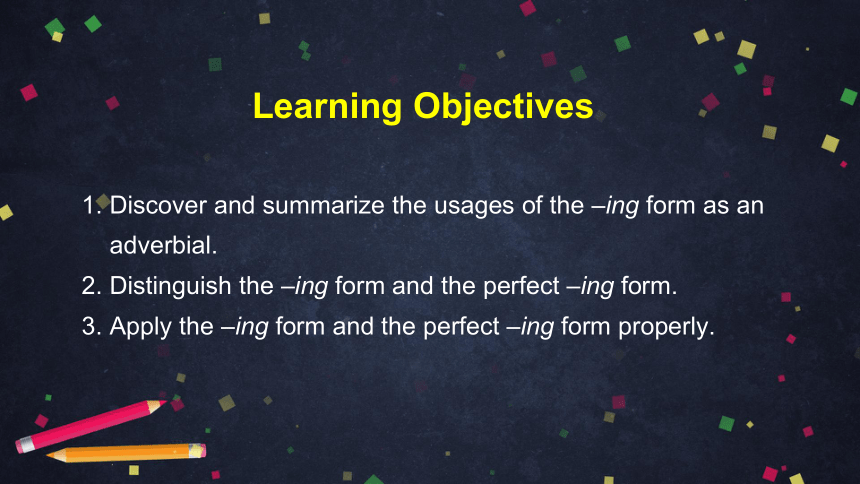
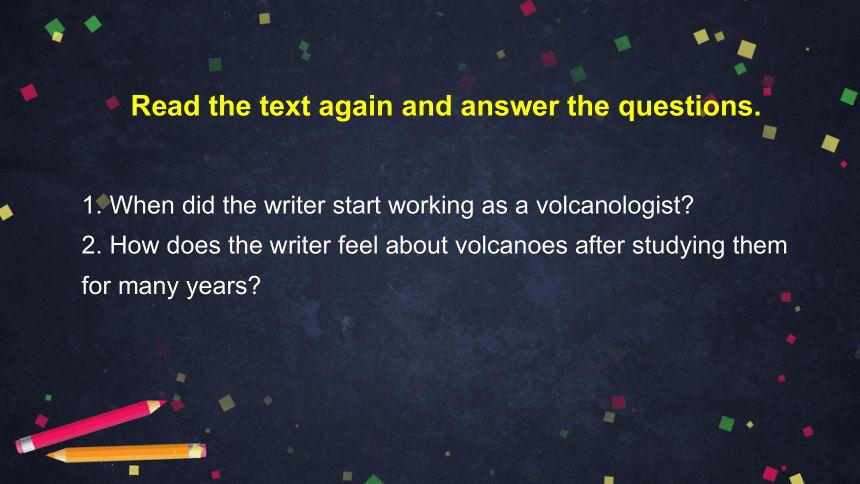
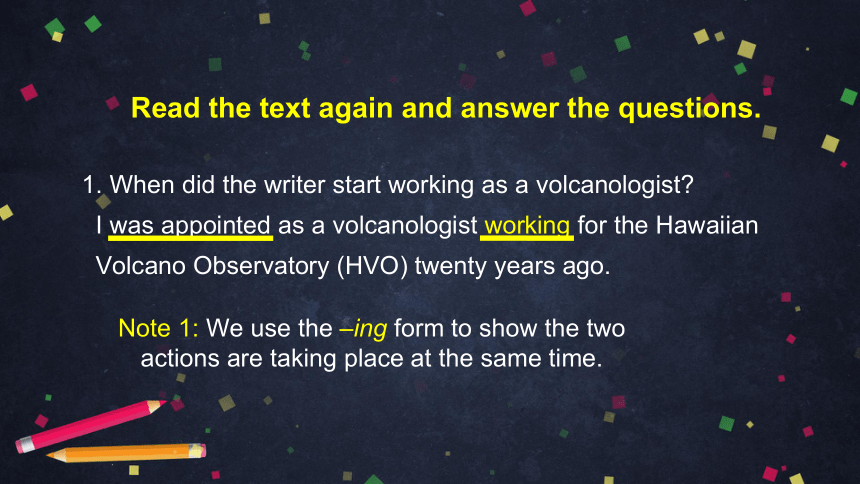
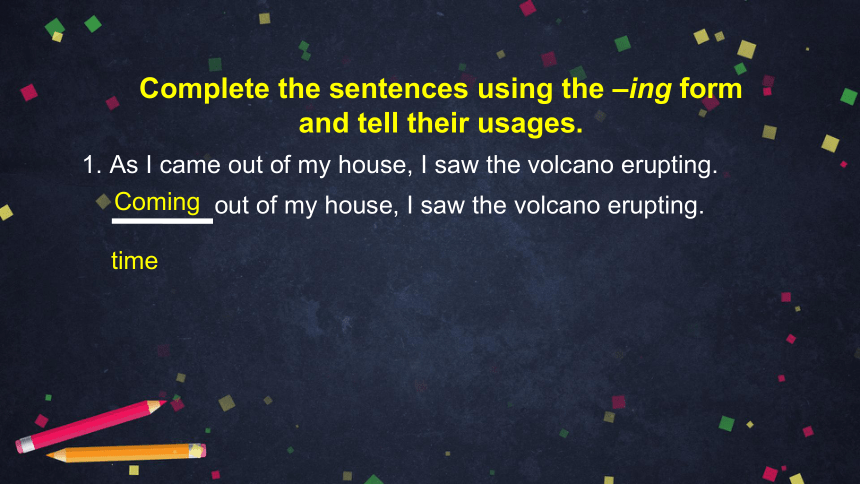
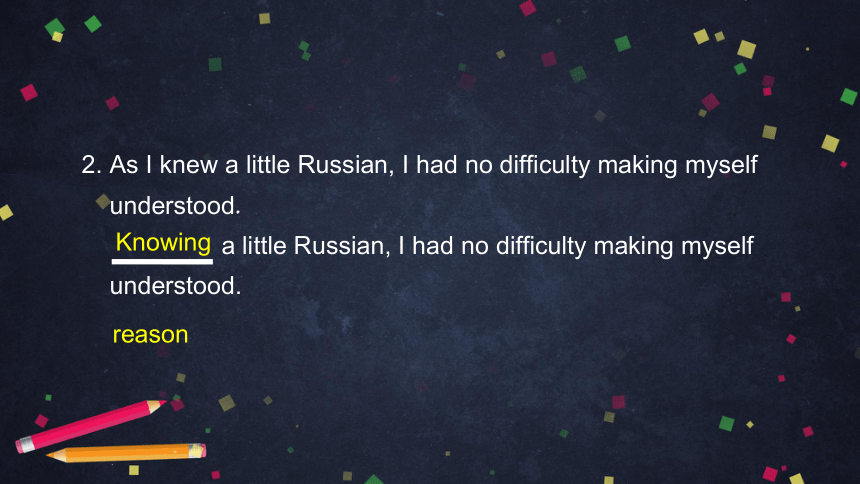
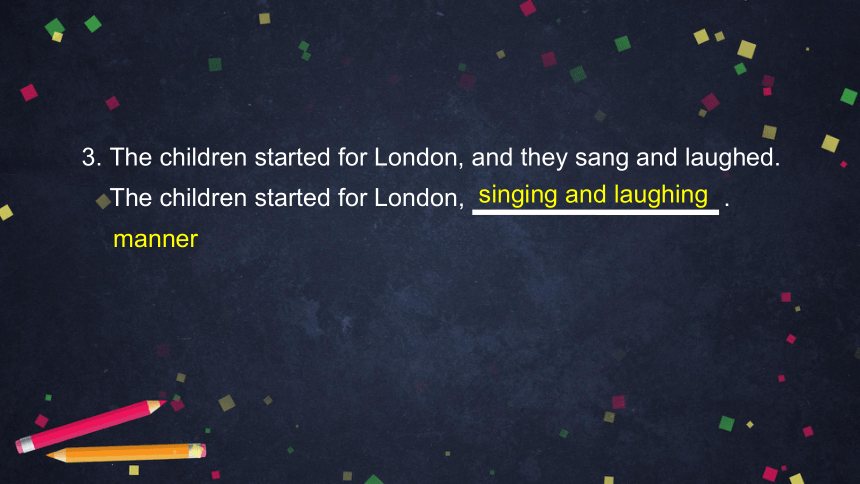
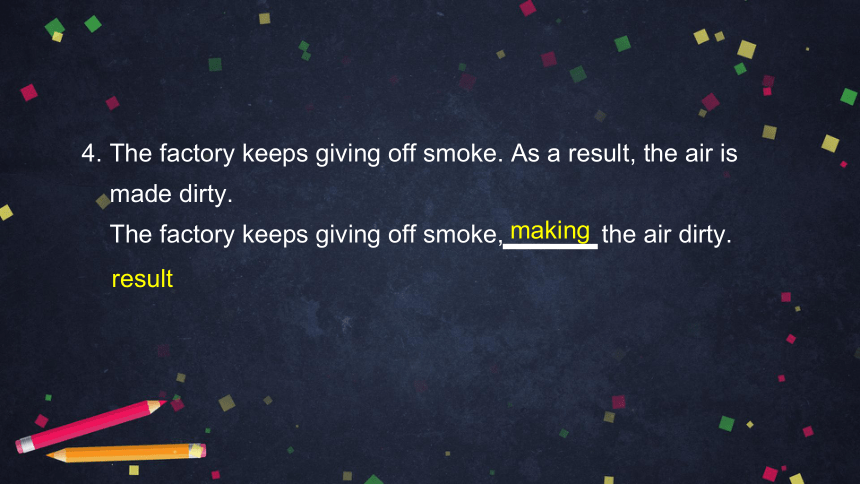
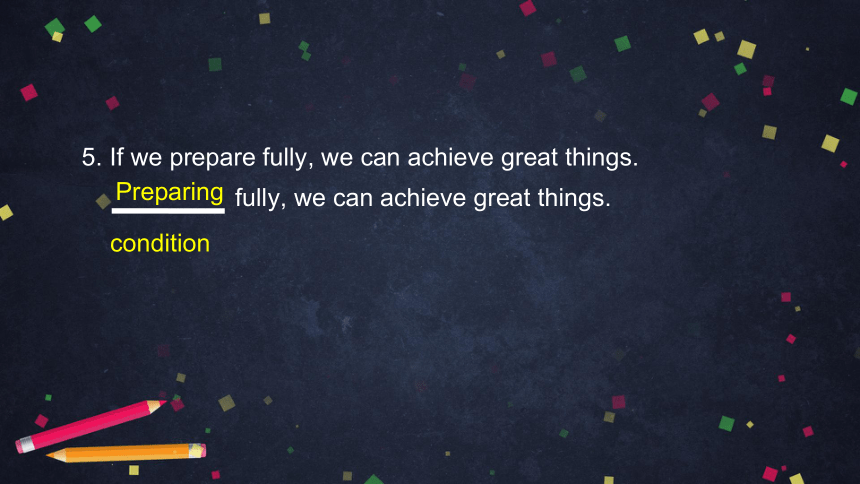
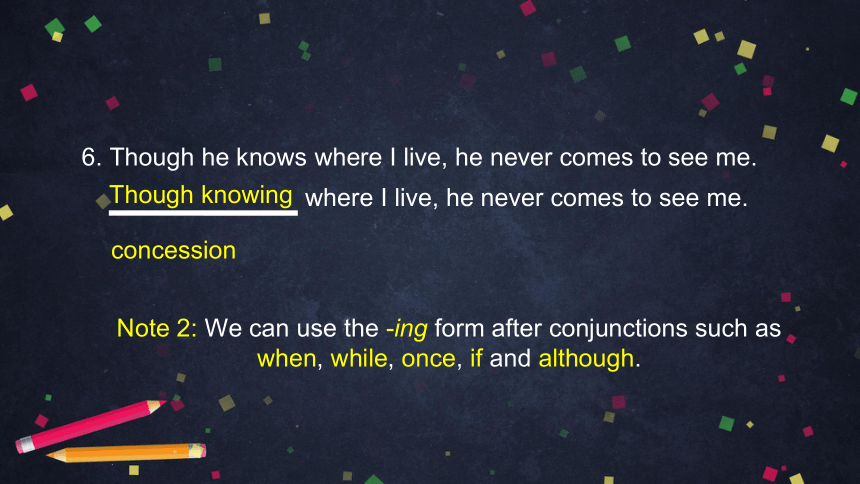
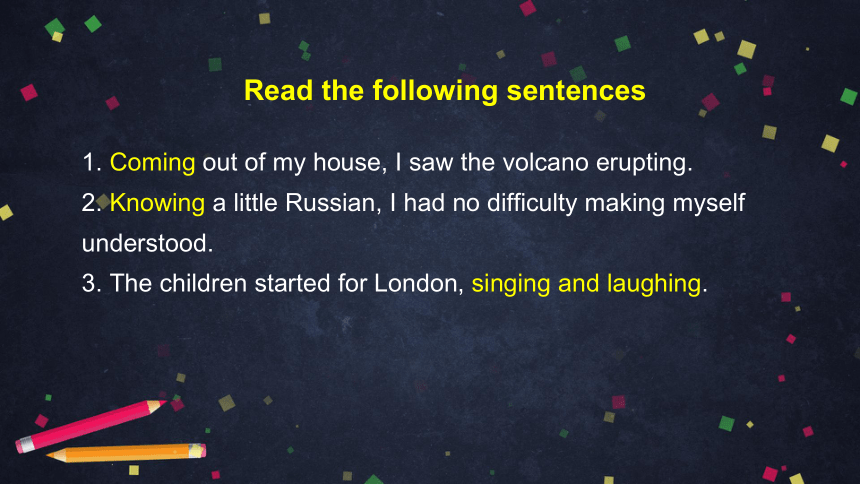
文档简介
(共60张PPT)
选修六
Unit
5
The
Power
of
Nature
(4)
高二年级
英语
Lesson
4
Revising
the
-ing
form
Grammar
Learning
Objectives
1.
Discover
and
summarize
the
usages
of
the
–ing
form
as
an
adverbial.
2.
Distinguish
the
–ing
form
and
the
perfect
–ing
form.
3.
Apply
the
–ing
form
and
the
perfect
–ing
form
properly.
Read
the
text
again
and
answer
the
questions.
1.
When
did
the
writer
start
working
as
a
volcanologist?
2.
How
does
the
writer
feel
about
volcanoes
after
studying
them
for
many
years?
1.
When
did
the
writer
start
working
as
a
volcanologist?
I
was
appointed
as
a
volcanologist
working
for
the
Hawaiian
Volcano
Observatory
(HVO)
twenty
years
ago.
Note
1:
We
use
the
–ing
form
to
show
the
two
actions
are
taking
place
at
the
same
time.
Read
the
text
again
and
answer
the
questions.
Complete
the
sentences
using
the
–ing
form
and
tell
their
usages.
1.
As
I
came
out
of
my
house,
I
saw
the
volcano
erupting.
out
of
my
house,
I
saw
the
volcano
erupting.
Coming
time
2.
As
I
knew
a
little
Russian,
I
had
no
difficulty
making
myself
understood.
a
little
Russian,
I
had
no
difficulty
making
myself
understood.
Knowing
reason
3.
The
children
started
for
London,
and
they
sang
and
laughed.
The
children
started
for
London,
.
singing
and
laughing
manner
4.
The
factory
keeps
giving
off
smoke.
As
a
result,
the
air
is
made
dirty.
The
factory
keeps
giving
off
smoke,
the
air
dirty.
making
result
5.
If
we
prepare
fully,
we
can
achieve
great
things.
fully,
we
can
achieve
great
things.
Preparing
condition
6.
Though
he
knows
where
I
live,
he
never
comes
to
see
me.
where
I
live,
he
never
comes
to
see
me.
Though
knowing
concession
Note
2:
We
can
use
the
-ing
form
after
conjunctions
such
as
when,
while,
once,
if
and
although.
1.
Coming
out
of
my
house,
I
saw
the
volcano
erupting.
2.
Knowing
a
little
Russian,
I
had
no
difficulty
making
myself
understood.
3.
The
children
started
for
London,
singing
and
laughing.
Read
the
following
sentences
4.
The
factory
keeps
giving
off
smoke,
making
the
air
dirty.
5.
Preparing
fully,
we
can
achieve
great
things.
6.
Though
knowing
where
I
live,
he
never
comes
to
see
me.
Note
3:
The
-ing
form
can
be
used
as
adverbial
to
express
time,
reason,
manner,
result,
condition
and
concession.
2.
How
does
the
writer
feel
about
volcanoes
after
studying
them
for
many
years?
Having
studied
volcanoes
now
for
many
years,
I
am
still
amazed
at
their
beauty
as
well
as
their
potential
to
cause
great
damage.
Note
4:
We
use
the
perfect
–ing
form
to
refer
to
an
action
that
took
place
before
the
time
expressed
by
the
main
verb.
Read
the
text
again
and
answer
the
questions.
Compare
and
tell
the
difference
1.
I
was
appointed
as
a
volcanologist
working
for
the
Hawaiian
Volcano
Observatory
(HVO)
twenty
years
ago.
2.
Having
studied
volcanoes
now
for
many
years,
I
am
still
amazed
at
their
beauty
as
well
as
their
potential
to
cause
great
damage.
1.
Having
collected
and
evaluated
the
information,
I
help
other
scientists
to
predict
where
lava
from
the
volcano
will
flow
next
and
how
fast.
2.Having
worked
hard
all
day,
I
went
to
bed
early.
Pick
out
the
sentences
from
the
reading
passage
with
the
perfect
–ing
form.
3.
Having
experienced
quite
a
few
earthquakes
in
Hawaii
already,
I
didn’t
take
much
notice.
4.
Having
earlier
collected
special
clothes
from
the
observatory,
we
put
them
on
before
we
went
any
closer.
1.
Having
collected
and
evaluated
the
information,
I
help
other
scientists
to
predict
where
lava
from
the
volcano
will
flow
next
and
how
fast.
2.
Having
worked
hard
all
day,
I
went
to
bed
early.
3.
Having
experienced
quite
a
few
earthquakes
in
Hawaii
already,
I
didn’t
take
much
notice.
4.
Having
earlier
collected
special
clothes
from
the
observatory,
we
put
them
on
before
we
went
any
closer.
Complete
the
sentences
with
the
perfect-ing
form
of
the
verbs:
arrive,
give,
spend,
take,
and
buy.
1.
the
wrong
bus,
Martin
found
himself
in
an
unfamiliar
district.
2.
her
opinion
about
protecting
the
environment,
she
left
the
meeting.
3.
the
precious
necklace,
she
had
no
money
left.
Having
taken
Having
given
Having
bought
Complete
the
sentences
with
the
perfect-ing
form
of
the
verbs:
arrive,
give,
spend,
take,
and
buy.
4.
all
day
at
home
writing,
the
novelist
went
out
for
a
walk
in
the
evening.
5.
early
for
his
date,
Mark
spent
time
reading
the
newspaper.
Having
spent
Having
arrived
Exercise
1:
Choose
the
correct
sentences
and
tell
the
reasons.
1.
(a)
Trying
hard
to
fix
my
computer,
the
dog
kept
staring
at
me.
(b)
Trying
hard
to
fix
my
computer,
I
noticed
the
dog
staring
at
me.
2.
(a)
Having
changed
the
oil
in
my
car,
my
hands
got
very
dirty.
(b)
Having
changed
the
oil
in
my
car,
I
found
I
got
dirt
all
over
my
hands.
√
√
1.
(b)
Trying
hard
to
fix
my
computer,
I
noticed
the
dog
staring
at
me.
2.
(b)
Having
changed
the
oil
in
my
car,
I
found
I
got
dirt
all
over
my
hands.
Note
5:
When
–ing
form
begins
a
sentence,
the
agent
of
the
–ing
form
must
be
the
subject
of
the
main
clause
that
follows.
Exercise
2:
Make
one
sentence
from
two
using
the
–ing
form
or
the
perfect
–ing
form.
1.
Tim
was
feeling
exhausted.
He
went
to
bed
as
soon
as
he
got
home.
2.
I
swallowed
the
nuts
too
quickly.
I
began
to
cough.
Feeling
exhausted,
Tim
went
to
bed
as
soon
as
he
got
home.
Having
swallowed
the
nuts
too
quickly,
I
began
to
cough.
3.
John
watched
the
volcano
erupt.
He
became
worried
about
his
safety.
4.
Because
he
had
been
trapped
in
traffic,
he
was
late
for
work.
Watching
the
volcano
erupt,
John
became
worried
about
Having
been
trapped
in
traffic,
he
was
late
for
work.
Note
6:
We
can
use
having
been
+verb
–ed
to
make
the
passive
perfect
form.
his
safety.
5.
I
am
very
clumsy.
I
tripped
and
broke
my
cell
phone.
6.
I
gathered
all
my
courage.
I
ran
back
into
the
burning
house
to
rescue
the
baby.
Being
very
clumsy,
I
tripped
and
broke
my
cell
phone.
Gathering
all
my
courage,
I
ran
back
into
the
burning
house
to
rescue
the
baby.
7.
She
doesn’t
have
a
car.
She
finds
it
difficult
to
get
around.
8.
They
haven’t
finished
the
project.
They
will
work
two
more
hours.
Not
having
a
car,
she
finds
it
difficult
to
get
around.
Not
having
finished
the
project,
they
will
work
two
more
hours.
Note
7:
The
negative
word
not
usually
appear
before
the
-ing
form.
9.
I
opened
a
strange
e-mail
attachment
yesterday.
I
started
having
computer
problems.
10.
I
guaranteed
that
we
would
get
there
before
five.
I
panicked
when
the
car
broke
down.
Having
opened
a
strange
e-mail
attachment
yesterday,
I
started
having
computer
problems.
Having
guaranteed
that
we
would
get
there
before
five,
I
panicked
when
the
car
broke
down.
Summary
1.
We
use
the
–ing
form
to
show
that
two
actions
are
taking
place
at
the
same
time.
2.
We
use
the
perfect
–ing
form
to
refer
to
an
action
that
took
place
before
the
time
expressed
by
the
main
verb.
3.
The
-ing
form
can
be
used
as
adverbial
to
express
time,
reason,
manner,
result,
condition
and
concession.
4.
The
agent
of
the
–ing
form
and
the
subject
of
the
main
clause
must
be
the
same.
5.
We
can
use
the
-ing
form
after
conjunctions
such
as
when,
while,
once,
if
and
although.
6.The
negative
word
not
usually
appear
before
the
-ing
form.
7.
We
can
use
having
been
+
verb
–ed
to
make
the
perfect
passive
form.
Quiz
1.
any
money,
Susan
decided
to
cut
her
hair
herself.(not
have)
2.
Before?
her
hair,
she
washed
it.(cut)
3.
her
hair,
Susan
reached
for
the
hair-dryer
and
scissors.(wash)
Not
having
cutting
Having
washed
4.
the
hair-dryer
in
her
left
hand,
Susan
cut
her
hair
with
the
scissors
in
her
right
hand.(hold)
5.
,
her
hair
looked
strange.(cut)
6.
Have
you
ever
seen
anyone
?
their
hair
this
way?
(cut)
Holding
Having
been
cut
cutting
Exercise
3:
Complete
the
following
passages
using
the
correct
form
of
the
words
given.
(be)
a
curious
person,
I
once
decided
to
search
the
Web
for
my
own
name.
Not
many
search
results
came
up,
but
one
labeled
“geeks”
caught
my
eye.
(look)
at
the
site,
I
almost
died!
It
was
my
face
–
a
classmate
(post)
it!
I
e-mailed
the
website,
and
they
took
it
off
the
next
day.
Being
Looking
had
posted
(complete)
a
20-page
story
for
my
creative
writing
class,
I
clicked
“print”.
Well,
my
computer
crashed
(print)
the
first
page!
Finally
at
10
P.M.,
(try)
everything
to
fix
the
computer,
I
started
rewriting
the
story
–
by
hand.
It
took
me
most
of
the
night!
Having
completed
printing
having
tried
Complete
the
report
below
using
the
correct
form
of
the
verbs
given.
An
eyewitness
account
of
a
murder
at
Flat
3,
Southampton
Gardens,
London
(arrive)
at
the
party,
I
found
all
my
friends
were
already
there.
The
dancing
was
just
beginning.
(stand),
I
saw
some
of
my
friends
chatting
at
a
table.
So
I
went
over
to
join
them.
(take)
a
drink,
I
(feel)
rather
uncomfortable
and
got
a
headache.
A
maid
took
me
upstairs
to
rest.
It
was
about
10
pm.
(rest)
for
a
while,
I
felt
better
and
went
to
the
balcony
to
have
some
fresh
air.
It
was
at
that
moment
that
I
realized
something
was
wrong.
(hear)
a
scream,
I
rushed
downstairs
only
to
see
my
hostess
lying
unconscious
on
the
floor,
surrounded
by
her
guests.
She
(shoot).
Exercise
3:
Complete
the
following
report
using
the
correct
form
of
the
verbs
given.
An
eyewitness
account
of
a
murder
at
Flat
3,
Southampton
Gardens,
London
(arrive)
at
the
party,
I
found
all
my
friends
were
already
there.
The
dancing
was
just
beginning.
(stand),
I
saw
some
of
my
friends
chatting
at
a
table.
So
I
went
over
to
join
them.
Arriving
Standing
(take)
a
drink,
I
(feel)
rather
uncomfortable
and
got
a
headache.
A
maid
took
me
upstairs
to
rest.
It
was
about
10
pm.
(rest)
for
a
while,
I
felt
better
and
went
to
the
balcony
to
have
some
fresh
air.
It
was
at
that
moment
that
I
realized
something
was
wrong.
(hear)
a
scream,
I
rushed
downstairs
only
to
see
my
hostess
lying
unconscious
on
the
floor,
surrounded
by
her
guests.
She
(shoot).
Having
taken
felt
Having
rested
Hearing
was
shot
Exercise
4:
Rewrite
the
description
of
the
pictures
using
the
–ing
form
or
the
perfect
–
ing
form
as
the
adverbial.
Rewrite
the
description
of
the
pictures
using
the
–ing
form
or
the
perfect
–
ing
form.
Early
in
the
morning,
we
rode
to
the
suburbs,
and
enjoyed
the
beautiful
view
along
the
way.
…,
enjoying
the
beautiful
view
along
the
way.
When
we
arrived
there,
we
began
to
work.
Arriving
there,
...
Everyone
had
their
hands
full,
some
were
digging
the
holes,
some
were
carrying
the
young
trees,
while
others
were
planting
and
watering
them.
…,
digging
the
holes,
carrying
the
young
trees,
planting
and
watering
them.
After
we
had
planted
all
the
trees,
we
put
up
a
board
to
remind
people
to
protect
the
trees.
Having
planted
all
the
trees,
…
At
last,
we
took
a
picture
in
front
of
the
trees,
because
we
hoped
to
record
this
great
memory
in
our
lives.
…,
hoping
to
record
this
great
memory
in
our
lives.
Attention,
please!
The
-ing
form
allows
us
to
include
information
without
making
long
or
complicated
sentences.
But
when
you
use
the
–ing
form
to
improve
your
writing,
try
to
use
it
necessarily
and
appropriately.
Exercise
5:
Describe
your
experience.
What
was
the
most
wonderful
experience
of
your
life?
Write
some
notes
of
what
you
saw
and
did,
and
how
you
felt.
Remember
to
use
the
-ing
form
as
the
adverbial.
Here
is
a
model
for
you
to
follow.
I.
I
heard
I
was
going
to
be
a
bridesmaid.
2.
I
felt
too
excited
to
sleep
well
the
night
before
the
wedding
day.
3.
In
the
morning
I
went
to
my
aunt’s
house
to
get
dressed.
4.
I
wore
a
blue
dress
and
my
aunt
wore
white.
My
aunt's
wedding
5.
I
carried
a
bunch
of
flowers
and
followed
my
aunt
and
her
father
into
the
church.
6.
I
walked
slowly
out
of
the
church
behind
my
aunt
and
her
husband
after
the
wedding.
7.
The
couple
were
happy.
What
was
the
most
…
experience
of
your
life?
(
Write
some
notes
of
what
you
saw
and
did,
and
how
you
felt.
)
It’s
your
turn!
Hearing
that
I
was
going
to
be
my
aunt’s
bridesmaid,
I
felt
so
excited
that
I
didn’t
sleep
well
that
night
before
my
aunt’s
wedding
day.
Although
feeling
tired
I
got
up
early
the
next
morning
and
went
to
my
aunt’s
house
to
get
dressed.
Having
put
on
my
blue
dress
I
carried
a
bunch
of
flowers.
One
possible
version
My
aunt
wore
a
white
dress.
Following
my
aunt
and
her
father
I
entered
the
church.
Everybody
was
smiling.
After
the
wedding,
I
left
the
church
walking
slowly
behind
my
aunt
and
her
husband.
They
were
both
looking
very
happy.
Evaluation
1.
Have
you
mastered
the
usages
of
the
–ing
form
as
an
adverbial?
2.
Can
you
distinguish
the
–ing
form
and
the
perfect
–ing
form?
3.
Can
you
apply
the
–ing
form
and
the
perfect
–ing
form
properly?
Homework:Describe
the
picture
book
Little
Penguin
Pip-Pip
would
love
to
join
in
with
all
his
friends
swimming
in
the
sea,
but
he’s
scared
of
water.
Can
Pip-pip
overcome
his
fears
and
finally
take
the
plunge?
Look
at
the
pictures
and
finish
the
description.
(Use
the
–ing
form
necessarily
and
appropriately.)
Homework
scare
laugh
at
encourage
help
try
jump
wait
worry
wait
worry
relieve
succeed
Little
penguin
Pip-pip
finally
made
it!
Sometimes
all
it
takes
is
a
little
bit
of
encouragement
to
make
that
leap
and
be
brave!
选修六
Unit
5
The
Power
of
Nature
(4)
高二年级
英语
Lesson
4
Revising
the
-ing
form
Grammar
Learning
Objectives
1.
Discover
and
summarize
the
usages
of
the
–ing
form
as
an
adverbial.
2.
Distinguish
the
–ing
form
and
the
perfect
–ing
form.
3.
Apply
the
–ing
form
and
the
perfect
–ing
form
properly.
Read
the
text
again
and
answer
the
questions.
1.
When
did
the
writer
start
working
as
a
volcanologist?
2.
How
does
the
writer
feel
about
volcanoes
after
studying
them
for
many
years?
1.
When
did
the
writer
start
working
as
a
volcanologist?
I
was
appointed
as
a
volcanologist
working
for
the
Hawaiian
Volcano
Observatory
(HVO)
twenty
years
ago.
Note
1:
We
use
the
–ing
form
to
show
the
two
actions
are
taking
place
at
the
same
time.
Read
the
text
again
and
answer
the
questions.
Complete
the
sentences
using
the
–ing
form
and
tell
their
usages.
1.
As
I
came
out
of
my
house,
I
saw
the
volcano
erupting.
out
of
my
house,
I
saw
the
volcano
erupting.
Coming
time
2.
As
I
knew
a
little
Russian,
I
had
no
difficulty
making
myself
understood.
a
little
Russian,
I
had
no
difficulty
making
myself
understood.
Knowing
reason
3.
The
children
started
for
London,
and
they
sang
and
laughed.
The
children
started
for
London,
.
singing
and
laughing
manner
4.
The
factory
keeps
giving
off
smoke.
As
a
result,
the
air
is
made
dirty.
The
factory
keeps
giving
off
smoke,
the
air
dirty.
making
result
5.
If
we
prepare
fully,
we
can
achieve
great
things.
fully,
we
can
achieve
great
things.
Preparing
condition
6.
Though
he
knows
where
I
live,
he
never
comes
to
see
me.
where
I
live,
he
never
comes
to
see
me.
Though
knowing
concession
Note
2:
We
can
use
the
-ing
form
after
conjunctions
such
as
when,
while,
once,
if
and
although.
1.
Coming
out
of
my
house,
I
saw
the
volcano
erupting.
2.
Knowing
a
little
Russian,
I
had
no
difficulty
making
myself
understood.
3.
The
children
started
for
London,
singing
and
laughing.
Read
the
following
sentences
4.
The
factory
keeps
giving
off
smoke,
making
the
air
dirty.
5.
Preparing
fully,
we
can
achieve
great
things.
6.
Though
knowing
where
I
live,
he
never
comes
to
see
me.
Note
3:
The
-ing
form
can
be
used
as
adverbial
to
express
time,
reason,
manner,
result,
condition
and
concession.
2.
How
does
the
writer
feel
about
volcanoes
after
studying
them
for
many
years?
Having
studied
volcanoes
now
for
many
years,
I
am
still
amazed
at
their
beauty
as
well
as
their
potential
to
cause
great
damage.
Note
4:
We
use
the
perfect
–ing
form
to
refer
to
an
action
that
took
place
before
the
time
expressed
by
the
main
verb.
Read
the
text
again
and
answer
the
questions.
Compare
and
tell
the
difference
1.
I
was
appointed
as
a
volcanologist
working
for
the
Hawaiian
Volcano
Observatory
(HVO)
twenty
years
ago.
2.
Having
studied
volcanoes
now
for
many
years,
I
am
still
amazed
at
their
beauty
as
well
as
their
potential
to
cause
great
damage.
1.
Having
collected
and
evaluated
the
information,
I
help
other
scientists
to
predict
where
lava
from
the
volcano
will
flow
next
and
how
fast.
2.Having
worked
hard
all
day,
I
went
to
bed
early.
Pick
out
the
sentences
from
the
reading
passage
with
the
perfect
–ing
form.
3.
Having
experienced
quite
a
few
earthquakes
in
Hawaii
already,
I
didn’t
take
much
notice.
4.
Having
earlier
collected
special
clothes
from
the
observatory,
we
put
them
on
before
we
went
any
closer.
1.
Having
collected
and
evaluated
the
information,
I
help
other
scientists
to
predict
where
lava
from
the
volcano
will
flow
next
and
how
fast.
2.
Having
worked
hard
all
day,
I
went
to
bed
early.
3.
Having
experienced
quite
a
few
earthquakes
in
Hawaii
already,
I
didn’t
take
much
notice.
4.
Having
earlier
collected
special
clothes
from
the
observatory,
we
put
them
on
before
we
went
any
closer.
Complete
the
sentences
with
the
perfect-ing
form
of
the
verbs:
arrive,
give,
spend,
take,
and
buy.
1.
the
wrong
bus,
Martin
found
himself
in
an
unfamiliar
district.
2.
her
opinion
about
protecting
the
environment,
she
left
the
meeting.
3.
the
precious
necklace,
she
had
no
money
left.
Having
taken
Having
given
Having
bought
Complete
the
sentences
with
the
perfect-ing
form
of
the
verbs:
arrive,
give,
spend,
take,
and
buy.
4.
all
day
at
home
writing,
the
novelist
went
out
for
a
walk
in
the
evening.
5.
early
for
his
date,
Mark
spent
time
reading
the
newspaper.
Having
spent
Having
arrived
Exercise
1:
Choose
the
correct
sentences
and
tell
the
reasons.
1.
(a)
Trying
hard
to
fix
my
computer,
the
dog
kept
staring
at
me.
(b)
Trying
hard
to
fix
my
computer,
I
noticed
the
dog
staring
at
me.
2.
(a)
Having
changed
the
oil
in
my
car,
my
hands
got
very
dirty.
(b)
Having
changed
the
oil
in
my
car,
I
found
I
got
dirt
all
over
my
hands.
√
√
1.
(b)
Trying
hard
to
fix
my
computer,
I
noticed
the
dog
staring
at
me.
2.
(b)
Having
changed
the
oil
in
my
car,
I
found
I
got
dirt
all
over
my
hands.
Note
5:
When
–ing
form
begins
a
sentence,
the
agent
of
the
–ing
form
must
be
the
subject
of
the
main
clause
that
follows.
Exercise
2:
Make
one
sentence
from
two
using
the
–ing
form
or
the
perfect
–ing
form.
1.
Tim
was
feeling
exhausted.
He
went
to
bed
as
soon
as
he
got
home.
2.
I
swallowed
the
nuts
too
quickly.
I
began
to
cough.
Feeling
exhausted,
Tim
went
to
bed
as
soon
as
he
got
home.
Having
swallowed
the
nuts
too
quickly,
I
began
to
cough.
3.
John
watched
the
volcano
erupt.
He
became
worried
about
his
safety.
4.
Because
he
had
been
trapped
in
traffic,
he
was
late
for
work.
Watching
the
volcano
erupt,
John
became
worried
about
Having
been
trapped
in
traffic,
he
was
late
for
work.
Note
6:
We
can
use
having
been
+verb
–ed
to
make
the
passive
perfect
form.
his
safety.
5.
I
am
very
clumsy.
I
tripped
and
broke
my
cell
phone.
6.
I
gathered
all
my
courage.
I
ran
back
into
the
burning
house
to
rescue
the
baby.
Being
very
clumsy,
I
tripped
and
broke
my
cell
phone.
Gathering
all
my
courage,
I
ran
back
into
the
burning
house
to
rescue
the
baby.
7.
She
doesn’t
have
a
car.
She
finds
it
difficult
to
get
around.
8.
They
haven’t
finished
the
project.
They
will
work
two
more
hours.
Not
having
a
car,
she
finds
it
difficult
to
get
around.
Not
having
finished
the
project,
they
will
work
two
more
hours.
Note
7:
The
negative
word
not
usually
appear
before
the
-ing
form.
9.
I
opened
a
strange
attachment
yesterday.
I
started
having
computer
problems.
10.
I
guaranteed
that
we
would
get
there
before
five.
I
panicked
when
the
car
broke
down.
Having
opened
a
strange
attachment
yesterday,
I
started
having
computer
problems.
Having
guaranteed
that
we
would
get
there
before
five,
I
panicked
when
the
car
broke
down.
Summary
1.
We
use
the
–ing
form
to
show
that
two
actions
are
taking
place
at
the
same
time.
2.
We
use
the
perfect
–ing
form
to
refer
to
an
action
that
took
place
before
the
time
expressed
by
the
main
verb.
3.
The
-ing
form
can
be
used
as
adverbial
to
express
time,
reason,
manner,
result,
condition
and
concession.
4.
The
agent
of
the
–ing
form
and
the
subject
of
the
main
clause
must
be
the
same.
5.
We
can
use
the
-ing
form
after
conjunctions
such
as
when,
while,
once,
if
and
although.
6.The
negative
word
not
usually
appear
before
the
-ing
form.
7.
We
can
use
having
been
+
verb
–ed
to
make
the
perfect
passive
form.
Quiz
1.
any
money,
Susan
decided
to
cut
her
hair
herself.(not
have)
2.
Before?
her
hair,
she
washed
it.(cut)
3.
her
hair,
Susan
reached
for
the
hair-dryer
and
scissors.(wash)
Not
having
cutting
Having
washed
4.
the
hair-dryer
in
her
left
hand,
Susan
cut
her
hair
with
the
scissors
in
her
right
hand.(hold)
5.
,
her
hair
looked
strange.(cut)
6.
Have
you
ever
seen
anyone
?
their
hair
this
way?
(cut)
Holding
Having
been
cut
cutting
Exercise
3:
Complete
the
following
passages
using
the
correct
form
of
the
words
given.
(be)
a
curious
person,
I
once
decided
to
search
the
Web
for
my
own
name.
Not
many
search
results
came
up,
but
one
labeled
“geeks”
caught
my
eye.
(look)
at
the
site,
I
almost
died!
It
was
my
face
–
a
classmate
(post)
it!
I
e-mailed
the
website,
and
they
took
it
off
the
next
day.
Being
Looking
had
posted
(complete)
a
20-page
story
for
my
creative
writing
class,
I
clicked
“print”.
Well,
my
computer
crashed
(print)
the
first
page!
Finally
at
10
P.M.,
(try)
everything
to
fix
the
computer,
I
started
rewriting
the
story
–
by
hand.
It
took
me
most
of
the
night!
Having
completed
printing
having
tried
Complete
the
report
below
using
the
correct
form
of
the
verbs
given.
An
eyewitness
account
of
a
murder
at
Flat
3,
Southampton
Gardens,
London
(arrive)
at
the
party,
I
found
all
my
friends
were
already
there.
The
dancing
was
just
beginning.
(stand),
I
saw
some
of
my
friends
chatting
at
a
table.
So
I
went
over
to
join
them.
(take)
a
drink,
I
(feel)
rather
uncomfortable
and
got
a
headache.
A
maid
took
me
upstairs
to
rest.
It
was
about
10
pm.
(rest)
for
a
while,
I
felt
better
and
went
to
the
balcony
to
have
some
fresh
air.
It
was
at
that
moment
that
I
realized
something
was
wrong.
(hear)
a
scream,
I
rushed
downstairs
only
to
see
my
hostess
lying
unconscious
on
the
floor,
surrounded
by
her
guests.
She
(shoot).
Exercise
3:
Complete
the
following
report
using
the
correct
form
of
the
verbs
given.
An
eyewitness
account
of
a
murder
at
Flat
3,
Southampton
Gardens,
London
(arrive)
at
the
party,
I
found
all
my
friends
were
already
there.
The
dancing
was
just
beginning.
(stand),
I
saw
some
of
my
friends
chatting
at
a
table.
So
I
went
over
to
join
them.
Arriving
Standing
(take)
a
drink,
I
(feel)
rather
uncomfortable
and
got
a
headache.
A
maid
took
me
upstairs
to
rest.
It
was
about
10
pm.
(rest)
for
a
while,
I
felt
better
and
went
to
the
balcony
to
have
some
fresh
air.
It
was
at
that
moment
that
I
realized
something
was
wrong.
(hear)
a
scream,
I
rushed
downstairs
only
to
see
my
hostess
lying
unconscious
on
the
floor,
surrounded
by
her
guests.
She
(shoot).
Having
taken
felt
Having
rested
Hearing
was
shot
Exercise
4:
Rewrite
the
description
of
the
pictures
using
the
–ing
form
or
the
perfect
–
ing
form
as
the
adverbial.
Rewrite
the
description
of
the
pictures
using
the
–ing
form
or
the
perfect
–
ing
form.
Early
in
the
morning,
we
rode
to
the
suburbs,
and
enjoyed
the
beautiful
view
along
the
way.
…,
enjoying
the
beautiful
view
along
the
way.
When
we
arrived
there,
we
began
to
work.
Arriving
there,
...
Everyone
had
their
hands
full,
some
were
digging
the
holes,
some
were
carrying
the
young
trees,
while
others
were
planting
and
watering
them.
…,
digging
the
holes,
carrying
the
young
trees,
planting
and
watering
them.
After
we
had
planted
all
the
trees,
we
put
up
a
board
to
remind
people
to
protect
the
trees.
Having
planted
all
the
trees,
…
At
last,
we
took
a
picture
in
front
of
the
trees,
because
we
hoped
to
record
this
great
memory
in
our
lives.
…,
hoping
to
record
this
great
memory
in
our
lives.
Attention,
please!
The
-ing
form
allows
us
to
include
information
without
making
long
or
complicated
sentences.
But
when
you
use
the
–ing
form
to
improve
your
writing,
try
to
use
it
necessarily
and
appropriately.
Exercise
5:
Describe
your
experience.
What
was
the
most
wonderful
experience
of
your
life?
Write
some
notes
of
what
you
saw
and
did,
and
how
you
felt.
Remember
to
use
the
-ing
form
as
the
adverbial.
Here
is
a
model
for
you
to
follow.
I.
I
heard
I
was
going
to
be
a
bridesmaid.
2.
I
felt
too
excited
to
sleep
well
the
night
before
the
wedding
day.
3.
In
the
morning
I
went
to
my
aunt’s
house
to
get
dressed.
4.
I
wore
a
blue
dress
and
my
aunt
wore
white.
My
aunt's
wedding
5.
I
carried
a
bunch
of
flowers
and
followed
my
aunt
and
her
father
into
the
church.
6.
I
walked
slowly
out
of
the
church
behind
my
aunt
and
her
husband
after
the
wedding.
7.
The
couple
were
happy.
What
was
the
most
…
experience
of
your
life?
(
Write
some
notes
of
what
you
saw
and
did,
and
how
you
felt.
)
It’s
your
turn!
Hearing
that
I
was
going
to
be
my
aunt’s
bridesmaid,
I
felt
so
excited
that
I
didn’t
sleep
well
that
night
before
my
aunt’s
wedding
day.
Although
feeling
tired
I
got
up
early
the
next
morning
and
went
to
my
aunt’s
house
to
get
dressed.
Having
put
on
my
blue
dress
I
carried
a
bunch
of
flowers.
One
possible
version
My
aunt
wore
a
white
dress.
Following
my
aunt
and
her
father
I
entered
the
church.
Everybody
was
smiling.
After
the
wedding,
I
left
the
church
walking
slowly
behind
my
aunt
and
her
husband.
They
were
both
looking
very
happy.
Evaluation
1.
Have
you
mastered
the
usages
of
the
–ing
form
as
an
adverbial?
2.
Can
you
distinguish
the
–ing
form
and
the
perfect
–ing
form?
3.
Can
you
apply
the
–ing
form
and
the
perfect
–ing
form
properly?
Homework:Describe
the
picture
book
Little
Penguin
Pip-Pip
would
love
to
join
in
with
all
his
friends
swimming
in
the
sea,
but
he’s
scared
of
water.
Can
Pip-pip
overcome
his
fears
and
finally
take
the
plunge?
Look
at
the
pictures
and
finish
the
description.
(Use
the
–ing
form
necessarily
and
appropriately.)
Homework
scare
laugh
at
encourage
help
try
jump
wait
worry
wait
worry
relieve
succeed
Little
penguin
Pip-pip
finally
made
it!
Sometimes
all
it
takes
is
a
little
bit
of
encouragement
to
make
that
leap
and
be
brave!
